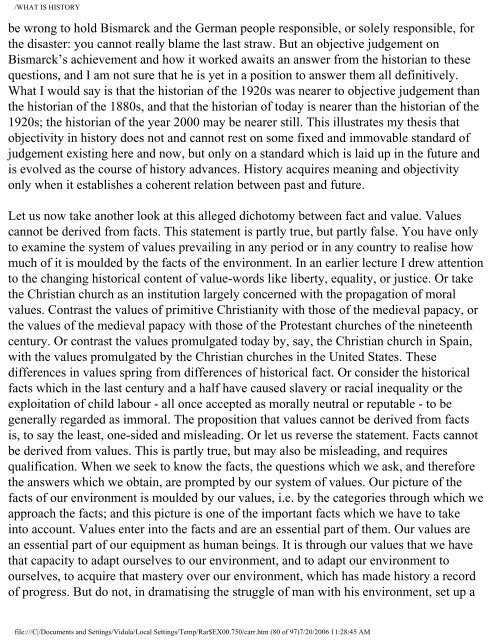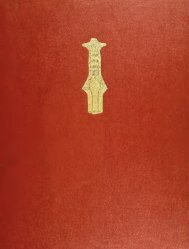What is History / by Edward Hallett Carr - Universal History Library
What is History / by Edward Hallett Carr - Universal History Library
What is History / by Edward Hallett Carr - Universal History Library
You also want an ePaper? Increase the reach of your titles
YUMPU automatically turns print PDFs into web optimized ePapers that Google loves.
WHAT IS HISTORY<br />
be wrong to hold B<strong>is</strong>marck and the German people responsible, or solely responsible, for<br />
the d<strong>is</strong>aster: you cannot really blame the last straw. But an objective judgement on<br />
B<strong>is</strong>marck’s achievement and how it worked awaits an answer from the h<strong>is</strong>torian to these<br />
questions, and I am not sure that he <strong>is</strong> yet in a position to answer them all definitively.<br />
<strong>What</strong> I would say <strong>is</strong> that the h<strong>is</strong>torian of the 1920s was nearer to objective judgement than<br />
the h<strong>is</strong>torian of the 1880s, and that the h<strong>is</strong>torian of today <strong>is</strong> nearer than the h<strong>is</strong>torian of the<br />
1920s; the h<strong>is</strong>torian of the year 2000 may be nearer still. Th<strong>is</strong> illustrates my thes<strong>is</strong> that<br />
objectivity in h<strong>is</strong>tory does not and cannot rest on some fixed and immovable standard of<br />
judgement ex<strong>is</strong>ting here and now, but only on a standard which <strong>is</strong> laid up in the future and<br />
<strong>is</strong> evolved as the course of h<strong>is</strong>tory advances. H<strong>is</strong>tory acquires meaning and objectivity<br />
only when it establ<strong>is</strong>hes a coherent relation between past and future.<br />
Let us now take another look at th<strong>is</strong> alleged dichotomy between fact and value. Values<br />
cannot be derived from facts. Th<strong>is</strong> statement <strong>is</strong> partly true, but partly false. You have only<br />
to examine the system of values prevailing in any period or in any country to real<strong>is</strong>e how<br />
much of it <strong>is</strong> moulded <strong>by</strong> the facts of the environment. In an earlier lecture I drew attention<br />
to the changing h<strong>is</strong>torical content of value-words like liberty, equality, or justice. Or take<br />
the Chr<strong>is</strong>tian church as an institution largely concerned with the propagation of moral<br />
values. Contrast the values of primitive Chr<strong>is</strong>tianity with those of the medieval papacy, or<br />
the values of the medieval papacy with those of the Protestant churches of the nineteenth<br />
century. Or contrast the values promulgated today <strong>by</strong>, say, the Chr<strong>is</strong>tian church in Spain,<br />
with the values promulgated <strong>by</strong> the Chr<strong>is</strong>tian churches in the United States. These<br />
differences in values spring from differences of h<strong>is</strong>torical fact. Or consider the h<strong>is</strong>torical<br />
facts which in the last century and a half have caused slavery or racial inequality or the<br />
exploitation of child labour - all once accepted as morally neutral or reputable - to be<br />
generally regarded as immoral. The proposition that values cannot be derived from facts<br />
<strong>is</strong>, to say the least, one-sided and m<strong>is</strong>leading. Or let us reverse the statement. Facts cannot<br />
be derived from values. Th<strong>is</strong> <strong>is</strong> partly true, but may also be m<strong>is</strong>leading, and requires<br />
qualification. When we seek to know the facts, the questions which we ask, and therefore<br />
the answers which we obtain, are prompted <strong>by</strong> our system of values. Our picture of the<br />
facts of our environment <strong>is</strong> moulded <strong>by</strong> our values, i.e. <strong>by</strong> the categories through which we<br />
approach the facts; and th<strong>is</strong> picture <strong>is</strong> one of the important facts which we have to take<br />
into account. Values enter into the facts and are an essential part of them. Our values are<br />
an essential part of our equipment as human beings. It <strong>is</strong> through our values that we have<br />
that capacity to adapt ourselves to our environment, and to adapt our environment to<br />
ourselves, to acquire that mastery over our environment, which has made h<strong>is</strong>tory a record<br />
of progress. But do not, in dramat<strong>is</strong>ing the struggle of man with h<strong>is</strong> environment, set up a<br />
file:///C|/Documents and Settings/Vidula/Local Settings/Temp/Rar$EX00.750/carr.htm (80 of 97)7/20/2006 11:28:45 AM







